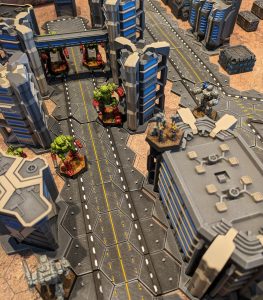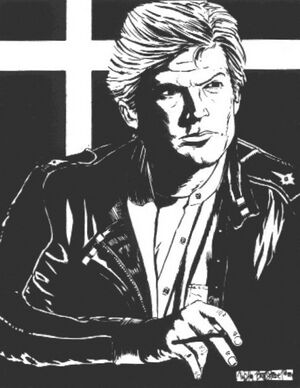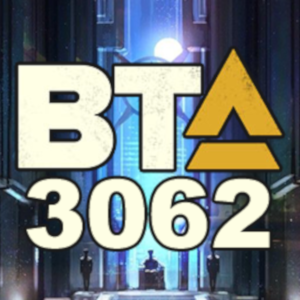James McKenna
Sarna News

- HEXTECH Review - Wave 3 Brings More Urban Options To Your Battlefield
- Your BattleTech News Round-Up For March, 2024
- Crashing 'Mechs With Jennifer Brozek, Author Of The Rogue Academy Trilogy
- Getting The Word Out With Rem Alternis, Catalyst Community & Marketing Director
- Bad 'Mechs - Yeoman
- Read more →
- This article is about the Director-General of the Terran Hegemony. For the WarShip, see James McKenna (Individual McKenna-class WarShip).
James McKenna | |
|---|---|
 | |
| Personal | |
| Born | 2274 |
| Died | 2338[1] |
| Affiliation | House McKenna |
| Profile | |
| Position(s) | Director-General |
| Family | |
| Siblings | Katherine McKenna[2] |
| Children | Konrad McKenna[1] |
James McKenna was a twenty-third century officer in the Alliance Global Navy and the first Director-General of the Terran Hegemony.
Contents
History[edit]
Early Years[edit]
Born in the nation-state of Canada on Terra, James grew up in the wilds of the Yukon Territories. He was not formally schooled until twelve years of age and would have taken lumberjack as his trade.
James was recruited by the Alliance Global Militia, where he was found to be talented at science and history. At the time he hadn't considered joining the military, despite his family's long history of service to the Terran Alliance. The AGM offered him a scholarship to the Annapolis Naval Academy, in the United States of America. Seeing this as an opportunity for a great education, he accepted.[3]
Military Career[edit]
McKenna's time at Annapolis was marred by mixed reviews resulting from his unusual personality. He swayed between winning prized honors, to nearly being removed from the school due to his rash behavior. After graduating with honors, his early career with the Alliance Navy was filled equally with seesawing from recognition for his unsurpassed ship handling abilities, to being constantly demoted for bad behavior over his first ten years of service. After much time, he finally settled down somewhat and took a few years to clear his reputation. Though not quite losing his willingness and ability to challenge the status quo.
In 2295, he obtained the rank of Fleet Admiral of the Alliance Navy. He initiated an ambitious plan to build up the Navy into a force to be reckoned with. The Navy by this time was only utilized as a means to transport the Alliance's troops. McKenna felt that the time of the Alliance being the only true interstellar nation was going to end, and he wanted to give his nation the means to be ready when that day came. He then began the program that would produce one of the first true combat JumpShips, the WarShips.
By 2314, McKenna's ambitious plan to beef up the Alliance Navy had borne fruit in the form of the TAS Dreadnought and its six sister ships. Other, lesser WarShips had been produced from the shipyards of Mars, Venus, and Terra. During this time, he was criticized for producing costly vessels which many saw as being mere playthings for him, with no easily foreseeable threats. He was interviewed in 2313 by the holonews program "Good Morning Canada," where he gave his views on the situation with the government and why he remained in service despite the hardships handed to him by an increasingly unstable regime. He stated that he wanted to remain active to see the ships he had built serve the people's alliance when the time came.
The Zoli Affair[edit]
After the assassination of the People's Independence Party political leader, Grant Zoli, a conflict broke out between the Liberal and Expansionist parties on September 5th, 2314, a month prior to the election for Prime Minister. News of the party leader's death led to violence between the two political factions.
The Admiral soon learned that Terra was in the grips of civil war, and that other neighboring worlds would soon follow. He issued a recall order to all Alliance ships and troops to Mars. During the course of the fighting, he kept most of the AGM forces from taking sides in the conflict.
He deployed small forces, however, and put an end to some of the fighting during the Battles of Zurich and Bangkok.[4]
On 2 June 2315, McKenna brought the TAS Dreadnought into orbit of Terra, where he had his ship's gunner target and destroy two uninhabited islands using the ship's Capital weaponry. These orbital strikes shocked the combatants on both sides of the fighting, causing combat to temporarily stop. He then made a worldwide broadcast from his WarShip to the people of the planet.
In his famous ultimatum, he took full responsibility for the destruction of the islands and sent a message to Terra's population. He told them that the political factions fighting the civil war had brought only ruin to Terra. McKenna went on to say that they had been lied to. The political factions were only fighting for their own personal gain and power. He asked the people of Terra for their support to form a better, stronger government. A government not influenced by the useless elections that had taken place in the past. He demanded that the fighting stop, and that those who agreed to his terms simply lay down their weapons and go home. Those who did not submit would be hunted down by a weary public, and the public's justice to be inflicted upon them.
His message brought abrupt change in the feelings of the people; many ran into the streets to support him. All AGM units that had been participating in the fighting returned to their barracks. He then carried out his warning, using precision strikes from orbit against the opponents of his demands. In heavy urban cities, McKenna dispatched Colonial Marines to destroy the political factions who refused to surrender.[5]
As Director General[edit]
After the fugitive political parties were hunted down and destroyed, McKenna wrote the Hegemony Charter, the layout of the government of the Terran Hegemony, aboard the TAS Dreadnought. In the Charter, he wrote that all political parties for each world would be abolished and replaced with a single Planetary Governor, to be a representative of his or her world. These governors would be appointed by the Director-General of the Hegemony, not by the local populace.
Historians have had doubts about whether McKenna actually wrote the Hegemony Charter, due to his past behavior. However, many point out that despite his late education, his passion for learning was evident, and that true intelligence was hidden underneath his brusque exterior.
In February 2316, He was elected by the people as the Hegemony's Director-General and Lord Protector. The election, voted with paper ballots by the people of the now former Alliance, confirmed the population was fed up with bureaucracy of the alliance and desired autocratic rule. Unknown to voters, McKenna's charters had also created a new form of nobility when Planetary Congresses were convened.
After setting up the government, the First meeting of the Hegemony Congress on Terra took place in early 2316, McKenna begun wrangling to make sure all former Alliance worlds would join the Hegemony. Most joined willingly, and some through political incentives. McKenna did have to dispatch some military forces to bring resisting worlds such as Caph and Altair into the Hegemony. Still, the Hegemony required more worlds to survive, so McKenna tried other incentives to recruit more systems. Some of these methods worked, however, as the borders expanded it became apparent that it was going take force to bring more worlds into the fold.
Campaigns of Persuasion[edit]
In March of 2316, McKenna led large fleets of WarShips and troopships to persuade worlds to join the Hegemony. His first and most noted conquests of this first wave of his campaign were the wealthy worlds of Errai, Helen, and Quentin. These worlds had formerly been members of a mutual defense treaty to provide some protection for themselves. These world's planetary leaders knew they could not prevent McKenna and his forces from taking their worlds, but they had connived between themselves to teach him a lesson. These leaders prepared to face McKenna with a fleet of WarShips converted from cargo ships and messenger vessels. They then were able to create several Divisions of militia troops. Fighting for these worlds proved to be brutal, but allowed his force to learn hard lessons and new methods for future campaigns. His first wave of conquest ended in 2317, with the conquest of Towne. McKenna's first campaign brought to heel forty worlds for the Hegemony.
In the year 2320, McKenna began the second wave of his Campaigns of Persuasion, which resulted in the conquest of: Capella, Nanking, and Terra Firma.[6]
New Nations and Third Campaign[edit]
However, McKenna's military was bogged with problems with technology and equipment. He had anticipated the rise of the powerful new nations forming around the Hegemony by the 2330s. Which once again brought doubt to his mind that he could bring all these worlds under his control.
He then turned to diplomacy in order reach his goals, no longer preaching all humanity should be under the Hegemony's control. Instead, McKenna began speeches of Terra being humanity's repository of compassion and knowledge. He revamped his Foreign Affairs Department, in order to begin new dialogue with the Hegemony's neighbors and establish interstellar relations with them.
Despite new relations with new powers, McKenna felt that unaffiliated worlds near Hegemony space were still open for the taking. So, in 2335, he launched what would become his last major military campaign. His aim was to take the worlds bordering the Federation of Skye. He then focused on two worlds within the Federation itself as its goal, Syrma and Galatea. These two water rich worlds had a population that harbored an antitechnology mentality, which to McKenna's eye made them easy pickings. He set off with his fleet of nearly 300 ships, with his son Vice Admiral Konrad McKenna as his second command.
The strike forces had successfully taken a number of worlds in the initial parts of the campaign. Though he was in name leading the fleet, McKenna's health had weakened. He turned control of the invasion to his son, Konrad, who up to now, had not seen combat.
As McKenna returned to Terra in his flagship, the Battlecruiser, THS Black Lion, his son Konrad begun to show his inexperience in combat situations during the invasion of Galatea. Then, in July 2338, McKenna's son, Konrad, made the fatal mistake of underestimating the people of Syrma. Konrad had constantly turned and blamed others rather than take responsibility for his own bad judgment. Konrad's inability became apparent when he deliberately sent HAF Army JumpShips in to the system ahead of their WarShip escorts. Unknown to all, the people of Syrma had cut a deal with the Federation of Skye. The Federation armed Syrma with mines and "sleeper missiles" designed to wait for the enemy to appear at the Jump Points. Thirty of the fleet's troopships were lost on the first jump into the system. The invasion's entire ground force was destroyed due to Konrad's bad tactics, making the entire invasion impossible.
As soon as the news of his son's bad judgment and behavior reached McKenna, he hastened with his flagship back to Syrma. Three weeks after the disastrous invasion, hiding among the wreckage of the invasion, McKenna's son was conducting a farce trial against the Admiral in command of the troopships. With reluctance, McKenna stripped his son of his ranks and privileges, taking command of the fleet. He apologized to the survivors of the invasion force for his son and ordered all to return to Terra.[7]
Retirement and Death[edit]
After returning to Terra, the truth of what had happened in the final portions of the campaign were revealed to the public. The old diehard supporters of the Alliance and other critics of the government begun demonstrations in the streets.
McKenna blocked all moves to prosecute his son for incompetence, which increased tensions among the ever-growing unrest within the Hegemony.
Things got worse as opponents prepared to fight a civil war when the news became public. Opponents began to call for McKenna's impeachment. When this came to pass, McKenna made a realmwide broadcast explaining he was torn between his service to the Hegemony, and family loyalty to his son. He then announced he would retire from the position of Director-General. His announcement shocked and surprised the people of the Hegemony, which were moved by his humility and the honesty of his message. This won him the loyalty of the people once more, though McKenna died of cancer ten days later.[8]
Personality and Appearance[edit]
James McKenna had a rambunctious personality and keen intelligence, noted for questioning and challenging authority. He was, prior to the coup taking over the Terran Alliance, a tall muscular man, with blond unkempt hair.[9]
Family and Legacy[edit]
James McKenna had fathered only one child, Konrad McKenna, who rose through the ranks of HAF Navy to the rank of Vice Admiral before his disgrace in 2338.
After his death, the Hegemony High Council decided to see if any of McKenna's relatives would be suitable for the job. McKenna's sister Katherine, and nephew Uston were passed over in search of a successor. They then turned to distant relatives as candidates to take the position as Director-General; Terran Congressman Graham Nellas and a third cousin, Michael Cameron.
McKenna had laid down the rules for political campaigns in the Hegemony charter; these rules were followed. In the end, feeling Nellas was not the man for the job, the general public voted for Michael to be the next Director-General.[10][11]
Many centuries after his death, a descendant by the name of Stephen McKenna followed General Aleksandr Kerensky, and later his son Nicholas Kerensky into exile with the Star League Defense Force in the Deep Periphery in 2784, eventually to found Clan Snow Raven, one of Nicholas' twenty Clans.[12]
Gallery[edit]
References[edit]
- ↑ 1.0 1.1 The Star League, p. 19: "The Death of James McKenna"
- ↑ The Star League, p. 20: "Rise of the Camerons"
- ↑ The Star League, p. 12: "James McKenna"
- ↑ The Star League, p. 13: "The Zoli Affair"
- ↑ The Star League, p. 14: "Time for a Change"
- ↑ The Star League, p. 15: "Terra's Errant Flock"
- ↑ The Star League, pp. 18–19: "The Syrma Ambush"
- ↑ The Star League, p. 19: "The Death of James McKenna"
- ↑ The Star League, p. 12: "Interview with the Admiral"
- ↑ The Star League, p. 20: "Rises of the Camerons"
- ↑ The Star League, p. 20: "Michael Victorious"
- ↑ Historical: Operation Klondike, pp. 115–116: "Stephen McKenna Profile"



